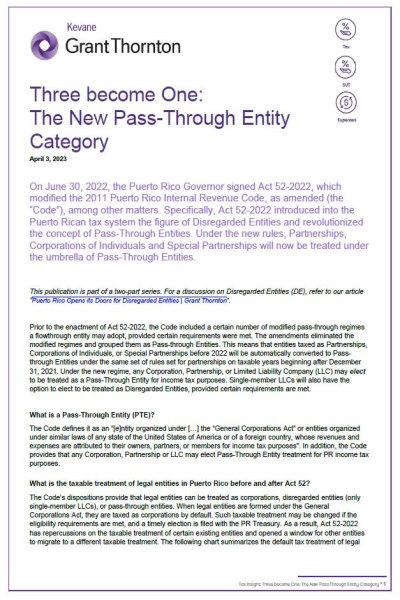-
Financial statements audits
Financial statement audits
-
Compliance audits
Compliance audits
-
Compilations and reviews
Compilations and audit
-
Agreed-upon procedures
Agreed-upon procedures
-
Tax compliance
Business Tax
-
Global mobility services
Through our global organisation of member firms, we support both companies and individuals, providing insightful solutions to minimise the tax burden for both parties.
-
Sales and use tax and indirect taxes
SUT/ VAT & indirect taxes
-
Tax incentives
Navigating the complex landscape of tax incentives in Puerto Rico can be challenging. Whether you're looking to benefit from the Export Services Act (Act 20), the Individual Investors Act (Act 22), or other incentives under Act 60, we provide tailored advice to help you maximize your tax benefits and ensure compliance. Let us help you unlock the potential of doing business in Puerto Rico.
-
Transfer Pricing
The laws surrounding transfer pricing are becoming ever more complex, as tax affairs of multinational companies are facing scrutiny from media, regulators and the public

-
Business consulting
Our business consulting services can help you improve your operational performance and productivity, adding value throughout your growth life cycle.
-
Business Risk Advisory
Risk is inevitable but manageable. We deliver relevant, timely and practical advices to aid organizations manage risk and improve business performance. We can help you identify, understand and manage potential risks to safeguard your business and comply with regulatory requirements.
-
Technology Advisory
We provide comprehensive solutions to safeguard your business and ensure operational resilience and compliance. Our expert team offers a range of technology advisory services designed to address your cybersecurity needs, enhance business continuity, and manage security effectively.
-
Transactional advisory services
Transactions are significant events in the life of a business – a successful deal that can have a lasting impact on the future shape of the organizations involved. Because the stakes are high for both buyers and sellers, experience, determination and pragmatism are required to bring deals safely through to conclusion.
-
Forensic and investigative services
At Grant Thornton, we have a wealth of knowledge in forensic services and can support you with issues such as dispute resolution, fraud and insurance claims.

On June 30, 2022, the Puerto Rico Governor signed Act 52-2022, which modified the 2011 Puerto Rico Internal Revenue Code, as amended (the “Code”), among other matters. Specifically, Act 52-2022 introduced into the Puerto Rican tax system the figure of Disregarded Entities and revolutionized the concept of Pass-Through Entities.
Under the new rules, Partnerships, Corporations of Individuals and Special Partnerships will now be treated under the umbrella of Pass-Through Entities.
This publication is part of a two-part series. For a discussion on Disregarded Entities (DE), refer to our article
“Puerto Rico Opens its Doors for Disregarded Entities | Grant Thornton”.
Prior to the enactment of Act 52-2022, the Code included a certain number of modified pass-through regimes a flowthrough entity may adopt, provided certain requirements were met. The amendments eliminated the modified regimes and grouped them as Pass-through Entities. This means that entities taxed as Partnerships, Corporations of Individuals, or Special Partnerships before 2022 will be automatically converted to Pass-through Entities under the same set of rules set for partnerships on taxable years beginning after December 31, 2021. Under the new regime, any Corporation, Partnership, or Limited Liability Company (LLC) may elect to be treated as a Pass-Through Entity for income tax purposes. Single-member LLCs will also have the option to elect to be treated as Disregarded Entities, provided certain requirements are met.
What is a Pass-Through Entity (PTE)?
The Code defines it as an “[e]ntity organized under […] the “General Corporations Act” or entities organized under similar laws of any state of the United States of America or of a foreign country, whose revenues and expenses are attributed to their owners, partners, or members for income tax purposes”. In addition, the Code provides that any Corporation, Partnership or LLC may elect Pass-Through Entity treatment for PR income tax purposes
What is the taxable treatment of legal entities in Puerto Rico before and after Act 52?
The Code’s dispositions provide that legal entities can be treated as corporations, disregarded entities (only single-member LLCs), or pass-through entities. When legal entities are formed under the General Corporations Act, they are taxed as corporations by default. Such taxable treatment may be changed if the eligibility requirements are met, and a timely election is filed with the PR Treasury. As a result, Act 52-2022 has repercussions on the taxable treatment of certain existing entities and opened a window for other entities to migrate to a different taxable treatment. The following chart summarizes the default tax treatment of legal entities in Puerto Rico before and after the enactment of Act 52-2022 and available elections after Act 52-2022.
|
Treatment of Legal Entities in Puerto Rico |
||
|
Legal Entity |
Pre-Act 52-2022 |
Post-Act 52-2022 |
|
Corporations (except for Corporations treated as Corporations of Individuals and Special Partnerships) |
· Compulsory Treatment- Corporations are subject to a two-fold tax. They are taxed at the entity level on their net taxable income and at the shareholder level on their distributions.
|
· Default Treatment – Same as the Compulsory Treatment before Act 52. · NEW Optional Treatment – For taxable years beginning after December 31, 2021, corporations may elect to be treated as Pass-Through Entities by timely filing the revised Form AS 6045 with their PR income tax return for the taxable year of the desired election’s effectiveness. |
|
Partnerships (includes entities treated as Special Partnerships and Corporation of Individuals) |
· Compulsory Treatment – Partnership’s revenues and expenses are attributed to its partners. Therefore, the entity is not subject to income tax. Instead, its partners are responsible for the income tax on their share of income. An exception to this rule applies for partnerships existing before 2011, which may be treated as corporations. |
· Compulsory Treatment - For taxable years beginning after December 31, 2021, Partnerships, Special Partnerships and Corporations of Individuals will be automatically considered Pass-Through Entities. However, those Partnerships in existence before 2011 may be treated as corporations, unless they elect to be treated as PTEs. |
|
LLC |
PR LLC · Default Treatment – PR LLCs are subject to income tax in the same manner as Corporations unless they elect to be treated as partnerships. o Available Election – They may elect to be treated as Partnerships.
Non-PR LLC Compulsory Treatment - Foreign LLCs are granted the same taxable treatment as in their country of origin, except for the disregarded entity treatment. If they are treated as a disregarded entity or as a partnership in their country of origin, in PR they are treated as a partnership. If corporations in their country of origin, they will be corporations in PR. |
PR LLC · Default Treatment – Same as Default Treatment before Act 52. o Available Election – For tax years after 2021, they may elect to be treated as PTE or DE (if eligible).
Non-PR LLC · Compulsory Treatment - Foreign LLCs are granted the same taxable treatment as in their country of origin. For tax years after 2021, Act 52-2022 requires that non-PR LLCs treated as partnerships in their base jurisdiction will be treated as PTEs in PR. Non-PR LLCs treated as disregarded entities can opt to elect the same treatment in PR. o Available Election – For tax years after 2022, Act 52-2022 allowed non-PR LLCs to elect to be treated as a disregarded entities under the Code if they are disregarded in their country of origin. |
Is an election required and how is it made?
As previously mentioned, for tax years beginning after December 31, 2021, entities that prior to taxable year 2022 were taxed as a Partnership, Special Partnership, or Corporation of Individuals will be automatically converted to PTE. Since the conversion is automatic, no election needs to be filed with the PR Treasury. On the other hand, eligible entities that on their last taxable year beginning before 2022, were taxed as Partnerships, Special Partnerships or Corporations of Individuals, may elect to change their taxable treatment for 2022 onwards to be taxed as a Corporation or Disregarded Entity (only single member LLCs) must do so by filing an election. Such election is made through the revised Form AS 6045, which must be filed with the PR income tax return corresponding to the taxable year in which the election is effective. To that end, in Administrative Determination 23-01 the PR Treasury indicated that once an entity elects to change its tax treatment, it will not be eligible to request another change during the following 60 months.
What is the tax impact of Converting to a PTE?
The table below summarizes the tax impact of an automatic conversion from a partnership, special partnership and corporation of individuals to a PTE and from a corporation to a PTE.
|
|
Tax Effects of a Pass-Through Entity Conversion |
||
|
Converted to |
Tax Effect |
||
|
Partnership, Special Partnership, and Corporation of Individuals |
Pass-Through Entity (Automatic conversion) |
1. Tax Exempt Conversion - The PTE will receive the assets and liabilities with the same tax basis, period of possession, and tax attributes in a tax-exempt transaction. This conversion will not affect any tax benefit enjoyed by the entity under a tax exemption grant. 2. Carryover prior conversion costs - The entity will keep any conversion cost that were pending before the conversion (e.g., tax on certain implicit gains, Last-in First Out benefits recapture, payments on E&Ps deemed distributed) |
|
|
Corporation |
Pass-Through Entity |
1. Complete Liquidation - Conversion will be treated as if on the last day of the taxable year prior to the election the Corporation was liquidated. The corporation will recognize a gain or loss as if its net assets were sold to its shareholders at fair market value. In the case of the shareholders, they are deemed to be selling the stock to the old corporation in exchange for the assets. Therefore, the shareholders recognize a gain if the fair market value of the stock exceeds its basis. The prior year tax returns of the old corporation and the shareholders may have to be amended to recognize the tax impact of this liquidation. 2. Contribution of Assets and Liabilities – Immediately after the liquidation, the owner or owners of the entity are deemed to have contributed all the assets and liabilities of the “old” Corporation to the “new” PTE. |
|
If the Special Partnership or Corporation of Individuals had a different tax year than its partners, does it need to seek approval from the Secretary to continue using its tax year as a result of the automatic conversion to PTEs?
PTEs must generally maintain the same taxable year of its partners unless a commercial purpose approved by the Secretary of the PR Treasury justifies using a different year. However, the PR Treasury recognizes that there are taxpayers who were treated as Special Partnerships or Corporations of Individuals before being PTEs and have a different taxable year than its partners under special Code dispositions that allowed them to do so without requiring to demonstrate a commercial purpose. The PR Treasury determined that these taxpayers automatically meet the “commercial purpose” requirement set forth in the Code with respect to PTEs. Therefore, any entity that was taxed as a Special Partnership or Corporation of Individuals on its last taxable year beginning before January 1, 2022, may continue to use the same taxable year after the PTE conversion for 2022 and subsequent years.
Additional remarks related to automatic PTE conversions
As a result of the automatic conversion, Special Partnerships and Corporations of Individuals will be following the Code dispositions applicable to PTEs. This change simplifies the taxation regime by streamlining the rules applicable to Partnerships, Corporations of Individuals and Special Partnerships, but entails the loss of certain benefits previously enjoyed by Corporation of Individuals and Special Partnerships. Here we list some pros and cons of this change.
Pros:
- The deadline to make the PTE election is streamlined. All elections are due with the first year returns for which the election will be effective. Before this change, there were different deadlines and processes to make the elections.
- PTEs that were Special Partnerships or Corporations of Individuals will not have to comply with the 70% and 90% gross income requirements, the specific activity requirement (e.g., construction, land development, etc.) or any other requirements under the Code to maintain their pass-through benefit.
- The automatic conversion to PTE is tax-free.
Cons:
- Non-PR resident partners of PTEs are deemed engaged in trade or business in Puerto Rico with respect to its distributive share. This means they are required to file a PR tax return to inform and pay taxes on their distributive share of income if their complete tax liability is not withheld at source (including branch profit tax, if applicable). This requirement is not imposed by the Code’s dispositions of the Corporation of Individuals or Special Partnerships.
- Partners of special partnerships and corporation of individuals lose the option to treat certain items of their distributive share (such as gains or losses in the exchange of capital assets, dividends, and other items) as part of their ordinary income or loss. This is not allowed under the PTE regime.
The implications of these changes must be carefully considered and analyzed to ensure that your business is in compliance with the new Code provisions. We have professionals with vast knowledge in this area that are available to assist your business and address any queries you may have.
Collaborators:
Samira Yassin, CPA, Esq. - Tax Manager
Madeleine Tubens, CPA, Esq. – Tax Manager
Eduardo Carlo, CPA – Tax Senior
Frederik de Jong, MBA – Tax Senior


